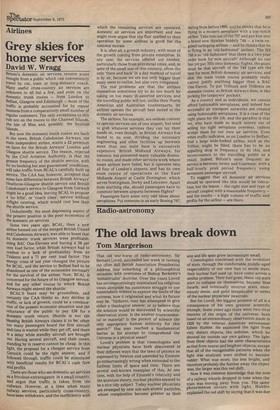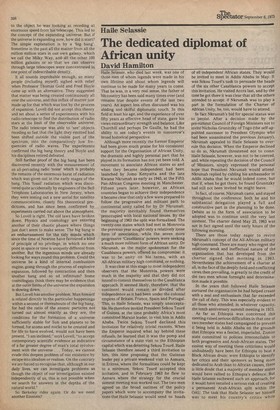Radio-astronomy
The old laws break down
Tom Margerison
That old war-horse of radio-astronomy, Sir Bernard Lovell, succeeded last week in turning the often dull British Association Presidential Address into something of a philosophical occasion, with overtones of Bishop Berkeley's 'immaterialist' doctrine. Over the years Lovell has uncompromisingly maintained his religious views alongside his passionate struggle to use materialistic science to explore the limits of the universe, how it originated and what its future may be. "Hitherto, man has attempted to give either a theological answer, or to believe that the solution would be discovered by scientific observation alone. Is the answer transcendental or material? Is the pursuit of science the only appropriate human actitivity for this search?" Has man reached a fundamental barrier in his attempt to comprehend the Universe in a physical sense?
Lovell's problem is that cosmologists and nuclear physicists have both discovered in their different ways that the laws of physics as expressed by Newton and amended by Einstein go embarrassingly wrong when extended to the furthest limits of space and time. There are several well-known examples of this. At one time, with the help of Einstein's relativity and the quantum theory, nuclear physics seemed to be a nice tidy subject Today nuclear physicists are swamped by new sub-sub-atomic particles, whose complexities become greater as their size and life span grow increasingly small.
Cosmologists concerned-with the evolution of stars, through the comfortable middle-aged respectability of our own Sun to senile stars, their nuclear fuel used up, have come across a similar problem. Their fuel gone, these old stars start to collapse on themselves, become blue dwarfs, and eventually neutron stars, enormously dense, and quite inexplicable in terms of the nuclear physicists' neutrons.
But for Lovell, the biggest proniem of all is a consequence of his own greatest scientific triumph. Some years ago there were two rival theories of the origin of the universe, both based on an extraordinary observation made in 1929 by the veteran American astronomer Edwin Hubble. He examined the light from very distant objects, the nebulae, which he showed lay outside our own galaxy. The light from these objects had the same characteristics as that from nearer and brighter objects, except that all of the recognisable patterns when the light was analysed were shifted to become redder. What was more, the less bright, and therefore probably the further away the object was, the larger was this red shift.
Now it was common knowledge that the note of a railway whistle dropped in tone when the train was moving away from you. The same phenomenon occurs with light. Hubble explained the red shift by saying that it was due
to the object he was looking at receding at enormous speed from his telescope. This led to the concept of the expanding universe. But if the universe is expanding now, how did it start? The simple explanation is by a 'big bang'. Sometime in the past all the matter from all the million million stars in our own galaxy, which we call the Milky Way, and all the other 100 million galaxies or so that we can observe through large telescopes were concentrated in: one point of indescribable density.
It all sounds improbable enough, so many people (including myself) sighed with relief when Professor Thomas Gold and Fred Hoyle came up with an alternative. They suggested that matter was being created continuously all over the universe, and this influx of matter just made up for that which was lost by the process of expansion. Lovell did not accept this theory and set about a series of experiments with his radio-telescope to find the distribution of radio stars at the limit of the observable universe. The radio telescope was able to 'see' objects receding so fast that the light they emitted had been shifted outside the visible part of the spectrum, into the comparatively low frequencies of radio waves, The experiments confirmed the big bang theory and I-Ioyle and his disciplines retired defeated.
Still further proof of the big hang has been discovered recently with the measurement of an all-pervading radio 'noise' which is probably the remains of the enormous burst of radiation which was given out in the early stages of the bang. This 'fossil' radiation which was discovered quite accidentally by engineers of the Bell Telephone Laboratories in New Jersey, when they were testing out a new aerial for satellite communications, closely fits theoretical predietions, and has since been confirmed by experiments carried out above the atmosphere.
So Lovell is right. The old laws have broken down. Physics and cosmology are entering another of their chaotic phases where things just don't seem to make sense. The big bang is an embarrassment for the tidy minds which since the time of Newton have favoured a kind of principle of no privilege, in which no one point in space or time is uniquely different from another. But the ingenious minds are already looking for ways round this problem. Could the universe be a kind of internal combustion engine, going through the process of explosive expansion, followed by contraction and then another hang and so ad infinitum? Some cosmologists think there may be evidence that at the outer limits of the universe the expansion is slowing down.
But Lovell has another problem. Man himself is related directly to the particular happenings within a second or thereabouts of the big bang, for had the ratio of the atomic particles not turned out almost exactly as they are, the conditions for the formation of a universe sufficiently stable for Sun and planets to be formed, for atoms and nuclei to be created and for life to have evolved, would not have been present. "I am inclined," says Lovell, "to accept contemporary scientific evidence as indicative" of a far greater degree of man's total involvement with the universe . . . Today, we cannot evade this deepest problem of our existence by escape into idealism or realism. On the contrary we are forced to recognise that, although in our daily lives, we can investigate problems as though the object of our investigation existed independently of us, this is not possible when we search for answers in the depths of the natural world."
So Berkeley rides again Or do we need another Einstein?



































 Previous page
Previous page